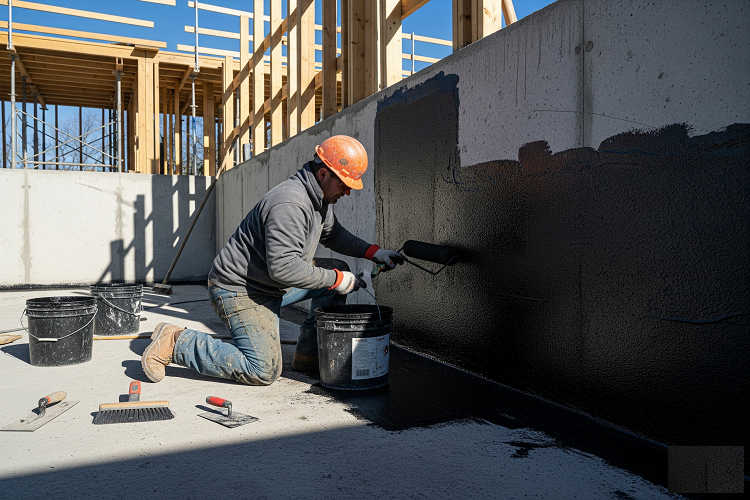
Water leakage in your new home? Now, that’s a nightmare no one wants to face. So, let’s dive into the nitty-gritty of how to keep your building dry and cozy with different waterproofing methods. Trust me, your future self will thank you!
Importance Of Waterproofing In Construction
Waterproofing isn’t just a fancy term thrown around by construction professionals; it’s an absolute necessity, especially in the UAE’s diverse climate. With the high humidity and occasional torrential downpours, your building needs to be as prepared as you are for a surprise rainstorm. Waterproofing makes sure your structure stays intact, preventing water damage that could lead to costly repairs, mold growth, and structural weakening. It’s like giving your building a robust raincoat that shields it from the elements.
Cementitious Waterproofing
Cementitious waterproofing is one of the most common methods, particularly favored by many waterproofing companies in the UAE. It is straightforward, easy to apply, and uses materials readily available from suppliers. This method involves applying a cement-based mixture to surfaces like walls and floors, creating a waterproof barrier. It’s perfect for internal wet areas such as bathrooms and kitchens, where water exposure is frequent but not extreme.
Liquid Waterproofing Membrane
Next up, we have a liquid waterproofing membrane – a more flexible option. This method involves applying a liquid layer that dries to form a rubbery, waterproof coating. It’s particularly effective for roofs and balconies, providing excellent protection against water seepage. Plus, its flexibility makes it resistant to the natural movement of buildings, ensuring long-lasting protection.
Bituminous Coating Waterproofing
When it comes to waterproofing, bituminous coating is a classic. It involves applying a bitumen-based substance that forms a protective layer over surfaces. It’s especially effective for underground structures like basements and foundations. Waterproofing companies in UAE often recommend this method for its durability and resistance to water pressure, ensuring your basement stays dry even during heavy rains.
Bituminous Membrane Waterproofing
For more robust protection, bituminous membrane waterproofing is an excellent choice. This method uses bituminous membranes that are applied over surfaces, creating a watertight barrier. It’s particularly suitable for flat roofs and underground structures, offering superior protection against water infiltration. The membranes can be self-adhesive or torched onto surfaces, depending on the specific requirements of the project.
Polyurethane Liquid Membrane Waterproofing
Polyurethane liquid membrane waterproofing is another popular method among waterproofing companies in the UAE. This method involves applying a liquid polyurethane coating that cures to form a seamless, waterproof membrane. It’s highly elastic and resistant to weathering, making it ideal for roofs, balconies, and terraces. The seamless nature of the membrane ensures there are no weak points for water to penetrate.
Sheet Membrane Waterproofing
Sheet Membrane waterproofing involves applying pre-fabricated sheets of waterproof material to surfaces. These sheets are typically made from materials like rubber or PVC, and they are adhered to surfaces using adhesives or mechanical fasteners. This method is particularly effective for large, flat areas like roofs and foundations, providing a uniform, durable waterproof layer.
Bentonite Waterproofing
Bentonite waterproofing is a unique method that utilizes bentonite clay to form a waterproof barrier. When hydrated, bentonite swells to form an impermeable layer that prevents water infiltration. This method is often used for below-grade applications, such as basements and tunnels. It’s particularly effective in preventing water seepage from the ground into underground structures.
Crystalline Waterproofing
Crystalline waterproofing is a cutting-edge technology that involves applying a crystalline compound to concrete surfaces. This compound reacts with water to form crystals that fill the pores and micro-cracks in the concrete, creating a waterproof barrier. It’s a highly effective method for protecting concrete structures from water damage and is often used for water tanks, swimming pools, and basements.
Comparison Of Different Waterproofing Methods
Each waterproofing method has its unique advantages and ideal applications. Cementitious waterproofing is perfect for internal wet areas, while liquid waterproofing membranes offer flexibility for roofs and balconies. Bituminous coatings and membranes provide robust protection for underground structures, and polyurethane liquid membranes are excellent for their elasticity and weather resistance. Sheet membranes are ideal for large, flat areas, while bentonite waterproofing is perfect for below-grade applications. Crystalline waterproofing offers cutting-edge protection for concrete structures.
Choosing the right waterproofing method for your project depends on several factors, including the type of structure, exposure to water, and budget. Consulting with professional waterproofing companies in UAE can help you determine the best solution for your specific needs. Remember, proper waterproofing is crucial to protect your investment and ensure the longevity of your building.
So, the next time you see dark clouds forming over the UAE, you can sit back, relax, and enjoy the rain, knowing your home is well-protected. For expert advice and top-notch waterproofing solutions, reach out to White Metal. Don’t wait for the next storm to remind you- waterproof your building today!


